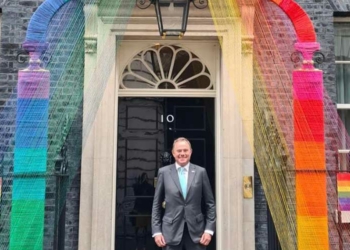Supermodel Lily Cole came out as queer, saying “I felt the need to acknowledge that I’m not straight.” And this is fair enough. Being married to a man does not preclude the possibility of Cole experiencing attraction towards women. Bisexuality exists – I have argued the point with a number of lesbian feminist friends who believe otherwise, and would gladly do so again. But where Cole loses me is her claim that “If I were living in another country today, my queerness would be a crime.”
Lily Cole has been in a heterosexual marriage for 9 years. She is not at risk of being beaten or called slurs because of whom she loves. Never would Cole have faced the horrifying possibility of losing custody of her daughter for being partnered with a man – a nightmare lived by countless lesbians around the world, for decades. Lily Cole has ample straight-passing privilege, regardless of whether she acknowledges it.
There was never a time or place when Cole could not have married her husband; whereas same-sex marriages were only legalised this century, by a minority of states. There isn’t a single nation in the entire world where a heterosexual union such as Cole’s would be criminalised. Conversely, there are several countries where lesbians face being imprisoned, raped, and even murdered, as punishment for their ‘deviant’ sexuality. One need only read Free to Be Me – Jane Traies’ extraordinary collection of interviews with the Lesbian Immigration Support Group – to grasp the brutal extent to which homosexuality is still penalised.
And this brutality doesn’t happen because of an innately held sense of self. Lesbians are being punished for loving others of the same sex, and rejecting the very life which Cole herself lives: life within a heterosexual union. Cole claims that she wants to break the “rigid boundaries” of sexuality. But what more rigid boundary is there than the dominance of the heteronuclear family? It’s the foundation on which patriarchy is laid; the lifeblood of compulsory heterosexuality.
As a conventionally feminine woman who is the wife of a man, and mother of his child, Cole meets society’s ideals of acceptable womanhood. Which means that her experience of coming out differs dramatically from that of women who live in defiance of those norms. Differences that are erased by the term ‘queer’, which collapses a broad spectrum of sexuality into a single, nebulous word.
When celebrities like Cole talk as if there were one universal ‘queer’ experience, we lose crucial nuance in conversations about what it means to come out; what it means to be lesbian, gay, or bisexual. We also lose the scope to identify and challenge how being out affects the most vulnerable people – for example, lesbian and gay people seeking asylum to escape persecution and even death in their country of birth.
When celebrities like Cole talk as if there were one universal ‘queer’ experience, we lose crucial nuance in conversations about what it means to coming out; what it means to be lesbian, gay, or bisexual.
I am not without sympathy for Cole. There was a time when I called myself queer. If memory serves, I even had “queer woman of colour” in my Twitter bio. Which is only slightly more cringe than the fact I once listed my Myers Briggs type (INTJ – the same as Vladimir Lenin, but also Martina Navratilova, so I’m not complaining). But in the end, I ditched the label. And I did it because of how people like Cole used ‘queer’ to wallpaper over the texture of lesbian life, sexuality, and experience.
Cole clearly felt it was important to come out, and I’ll always defend the right of gay or bi people to do so. That being said, we are never going to stop the homophobic human rights violations Cole alluded to while pretending that a woman married to a man would be at risk because of her “queerness.” And there is something grotesque about a rich white celebrity to conflating her struggle with that of the most vulnerable members of our community.
Claire Heuchan is an author, essayist, and Black radical feminist. She writes the award-winning blog, Sister Outrider.
























Comments
No comments yet, be the first to leave a comment.